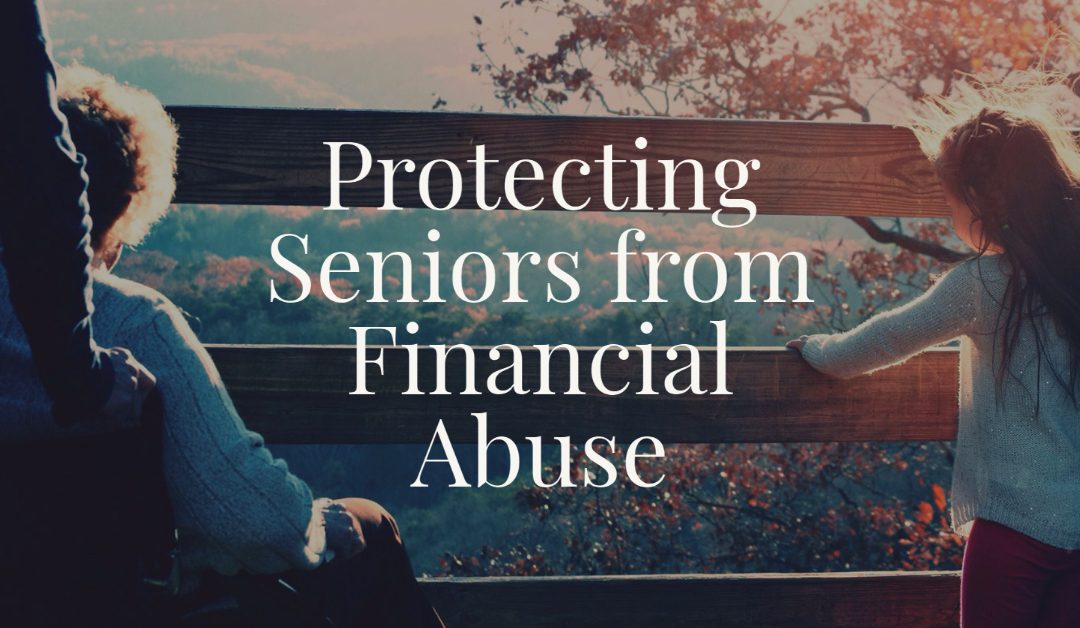North Carolina Law makes it a felony to financially exploit adults over the age of 60. A person commits a felony if they stand in a position of trust or are in a business relationship and choose to deprive an older adult of their assets to benefit someone else. With the growing number of older people in our society, this issue is of mounting concern for our country.
According to an MMI study entitled, Broken Trust: Elders, Family and Finance, elder financial abuse costs older Americans more than $2.6 billion per year. No matter what age you are now, this issue is bound to impact your life eventually. Learn how to protect yourself and those you love.
More Than Financial Abuse
Elder abuse victims of physical and emotional abuse and neglect often also experience financial abuse. Elder Mistreatment: Abuse, Neglect, and Exploitation in an Aging America reports on a study that found only 37.6 percent of cases in their county involved only financial exploitation. Physical and psychological abuse are often found in cases of financial abuse. Because of the likelihood of multiple abuses occurring at the same time, it is important to notice when a senior is struggling financially. There could be financial exploitation and other abuses/neglect happening also.
Who Reports Financial Abuse?
Neighbors, hospitals, attorneys, friends, neighbors, landlords, police, and family members often report suspected abuse to Adult Protective Service Agencies, but less than 2% of financial exploitation reports come from the victim themselves. Victims are often not fully competent or feel ashamed at their inability to care for themselves. Many are unlikely to report because they do not understand that they are being taken advantage of. We all have a duty to report if we see someone who is being hurt by someone in a position of authority or trust.
What Warning Signs Do I Look For?
Taken from “Financial Abuse of the Elderly in Domestic Setting”, these are warning signs that someone you know may be facing elder financial exploitation.
- taking, misusing, or using without knowledge or permission money or property
- forging or forcing an elder person’s signature
- abusing joint signature authority on a bank account
- misusing ATMs or credit cards
- cashing an elder person’s checks without permission or authorization
- misappropriating funds from a pension
- getting an elder person to sign a deed, will, contract, or power of attorney through deception, coercion, or undue influence
- providing true but misleading information that influences the elder person’s use or assignment of assets
- persuading an impaired elder person to change a will or insurance policy to alter who benefits from the will or policy
- using a power of attorney, including a durable power of attorney, for purposes beyond those for which it was originally executed
- improperly using the authority provided by a conservatorship, trust, etc.
- negligently mishandling assets, including misuse by a fiduciary or caregiver
- promising long-term or lifelong care in exchange for money or property and not following through on the promise
- overcharging for or not delivering caregiving services
- denying elder persons access to their money or preventing them from controlling their assets
What to Do if You Suspect Abuse or Exploitation
If you suspect elder abuse or financial exploitation is occurring, it is of utmost importance to make a report. Let the Adult Protective Agency in your area know what you suspect. It can’t hurt for them to look into a situation and it can protect the most vulnerable when you speak up. When you bring bad situations into the light, something can be done and the most vulnerable are protected. We all are vulnerable to abuse in our lives and sometimes at the mercy of the kind people around us.
Prevent Exploitation
There is much you can do to prevent elder financial exploitation. You can learn how to play a protective role for the older people in your social circle by staying on top of the latest scams and frauds that people face, watching out for warning signs and making reports to local authorities, and helping elderly find assistance from social services if they are isolated, living in poverty, or alone.
Legal Solutions
You can also help an elderly person find someone they trust to handle their financial responsibilities. Ideally, seniors should work with attorneys while they are still fairly young to make a plan for the unexpected.
Estate planning is about making a plan to keep yourself financially and physically cared for if/when you become incapacitated or incompetent. It includes the powers of attorney that name someone you trust to make medical and financial decisions for you.
These legal documents prepare you for the day that you may not be capable of handling your own affairs. We all need to make a plan for the unexpected:
- Because of the rising prevalence of dementia and Alzheimer’s
- Because of accidents that can leave us disabled or incapacitated
- Because of the pandemic or other viruses or cancer that can leave us incapable and vulnerable
Seek Help
If you are concerned about yourself or someone you know and want to find legal solutions to your issues, contact us at Hopler, Wilms, and Hanna. We are concerned with keeping the most vulnerable of our population safe. We work with clients daily to make plans that keep finances safe from exploitation and health care decisions in the best hands. Our families are important to us also and we understand what is at stake when the weak are unprotected. We want to fight for the rights of those who can’t fight for themselves.

